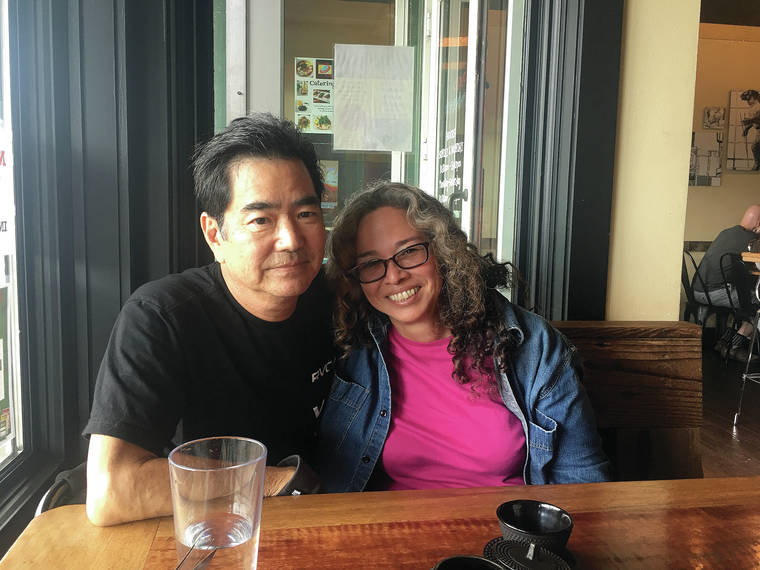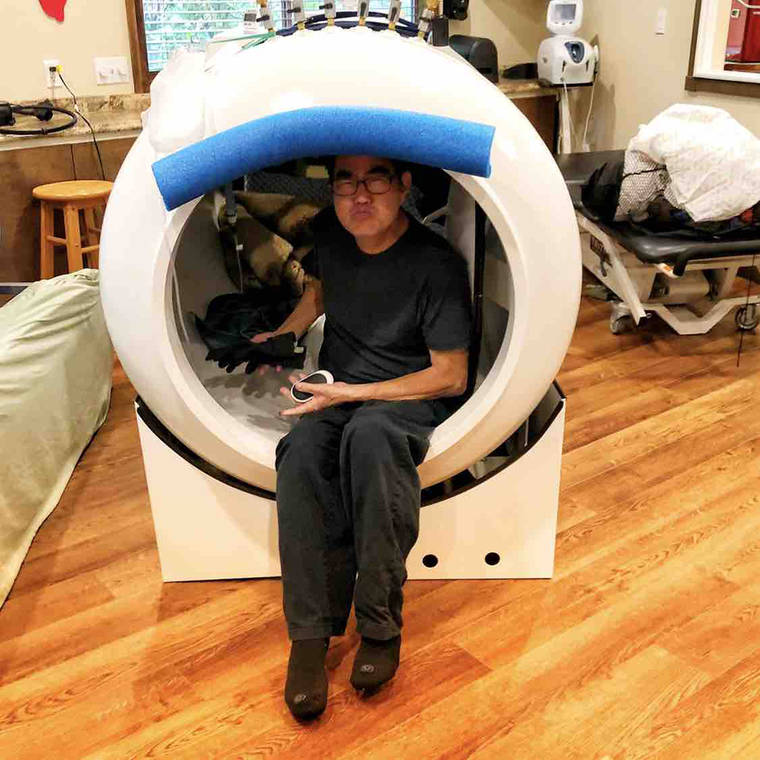WAIMEA — Beloved Chef Edwin Goto needed a few moments Tuesday to find the words to express his gratitude for the community that’s raised more than $18,600 in just a few days to help with costly treatments and seeing doctors for a severe case of Raynaud’s Syndrome.
“All I can do is thank everyone for being just so giving and so nice and caring,” said Goto over a cup of green Matcha tea at his Noodle Club restaurant.
Next to him, his wife, Dore Centeio, broke into tears, explaining how much the words, prayers and contributions from people around the Big Island, Hawaii and United States mean to the family and their 16-year-old daughter.
“It’s been really humbling, it’s been very touching, extremely touching. We can’t thank them enough,” she said. “It’s so moving. They’ve been so kind, so thoughtful and supportive and generous.
“It’s beyond being able to express.”
Goto, the proprietor of Waimea’s Village Burger and Noodle Club, has been diagnosed with a severe case of Raynaud’s Syndrome that seemingly showed up out of nowhere around the end of June. He said one day after working an event, he woke up hurting.
“My joints, my feet, my ankles, my elbows my knees my hips everything was sore,” he said. “Everything was really painful.”
Goto thought it was unusual, they were not his normal aches and pains, but he figured he’d shake it off in a day. That wasn’t the case. The next day it was worse.
“By the third day, I had difficulty walking that’s how painful it was,” he said. “It was very fast.”
When the tips of his fingers began to turn blue, he went to the doctor, who looked at it and said he thought it may be Raynaud’s Syndrome. A referral to a Waimea rheumatologist confirmed that and that the condition was actually secondary diagnosis. Doctor’s have yet to figure out the primary cause.
“It’s not that the doctors aren’t trying to help, they’re stumped,” Centeio said. Everything that doctors have tested for has come back negative.”
Raynaud’s is a rare disorder that affects the arteries, which are the blood vessels that carry blood from your heart to different parts of your body, according to the National Health, Lung and Blood Institute. The disorder is marked by brief episodes of vasospasm, or a narrowing of the blood vessels, that reduces blood flow to the fingers and toes.
According to the institute, there are two main types of Raynaud’s — primary and secondary. The cause of primary Raynaud’s isn’t known, though it is more common, easier to manage and often less severe than secondary Raynaud’s. Secondary Raynaud’s is caused by an underlying disease, condition, or other factor.
Most people who have Raynaud’s have no long-term tissue damage or disability. However, people who have severe Raynaud’s can develop skin sores or gangrene from prolonged or repeated Raynaud’s attacks.
That’s what happened to Goto.
The chef tried to continue his art — cooking — after coming down with Raynaud’s, but after getting a cut on his finger, he had to hang up his apron in July because the wound won’t heal. Raynaud’s is keeping blood from reaching his extremities, allowing gangrene to set in to two of his fingers.
The pain from the condition is also unbearable. At any given time, his pain level is at about a 7 out of 10. When it really sets in, “it’s like new levels of 10,” she said.
“It’s constant,” said Goto. “It’s just pins and needles or it’s like sticking your hand in an ice bucket and not being able to remove it. You know that dull kind of pain?”
Prescription pain medication helps, but not enough, and the only thing so far that’s brought Goto relief from his symptoms is hyperbaric treatment at Healthways in Waimea. The oxygenated blood getting to his extremities also appears to be slowing down the degradation of his fingers.
But unlike other doctor’s visits and prescriptions, hyperbaric treatment isn’t covered by insurance and costs about $5,000 for 40 treatments, and more on Oahu.
“It’s the only thing that we can do until we find help,” Centeio said.
And they’re trying to find that assistance. The family, after hearing of some experimental treatments using Botox, is now looking to mainland doctors for help getting to the bottom of what is causing the Goto’s bout of secondary Raynaud’s.
“We’re hoping that we can find someone who’s seen this with these different type of symptoms,” Centeio said. “We’re hoping that we can get the right help because without the pain medicine it’s pretty awful.”
They have an appointment to see a specialist at Stanford in December, but want and need to be ready to go at a moment’s notice should an appointment come available. Any contributions via GoFundMe will be used to get Goto the necessary treatment to get him back into his kitchens.
“We want him to be able to keep doing what he loves to do,” Centeio said.
Between the two restaurants, 30 people are employed by Goto and Centeio. Centeio also operates a granola business, selling her goods at farmers markets. Their employees have nothing but good to say, including one who came back to help Goto when he was diagnosed with Raynaud’s Syndrome.
“Chef Edwin is really well loved by all of us here and the community,” said Tasha Kunishige. “Whatever we can do to continue to get the business going and get him better we’ll do it.”
To contribute, visit https://www.gofundme.com/f/help-chef-ed-goto-get-medical-treatment?utm_medium=copy_link&utm_source=customer&utm_campaign=p_na+share-sheet&rcid=2719731b9d7a47d9b5e95c24a0465c97




